Three Things I've Learned Fundraising
I am in the middle of my second fundraising campaign this year. The first was for our annual ice show. Now, I am collecting donations for the Beaver Dam Family Center's annual fundraising banquet, held next weekend.
This is the first year I've done anything like this and I've discovered I'm actually pretty good at it. However, as is the case with most new things, I also learned some important things along the way.
First, you can't rely on mailers. I'm not saying sending out donation request letters to local businesses was a complete failure. I did manage to receive some donations. But, for this banquet, we sent out nearly 200 letters and only got about 15 donations back as a direct result of them. That's not a very good response.
When I followed up with some of the businesses, I was told they didn't even look at the letters and threw them right in the recycle bin. As a result, I found follow-up is very important. In fact, when I do this again in a couple months (for our next ice show), I'm probably going to save the letters as a last resort and rely more on e-mail and personal visits.
Groupon is a good place to find in-kind sponsors. I originally started out on Groupon because I had quite a few cash donations and figured I might be able to use some of those to buy a good raffle or silent auction item. But, mostly because I am a notorious penny pincher, I wound up spending almost none of that cash (just what we needed for supplies) and, instead, e-mailed the businesses asking for donations.
The response from doing that was pleasantly surprising. I wound up with a variety of gift certificates from businesses I wouldn't have normally even thought about approaching. It was win-win. We have items we can raffle or auction off and they are gaining new customers as a result (the main reason many of them are on Groupon in the first place).
It helps to have a game plan. This isn't the case with all of them, but some businesses are very cooperative if you approach them with a specific request. For example, we knew a fire ring would be popular and were able to find a business willing to donate one. I've also gotten a variety of other certificates and physical items because I was able to tell the business specifically how we planned on using the donation (local restaurant certificates, for example, went in a "Tastes of Beaver Dam" basket).
This is the first year I've done anything like this and I've discovered I'm actually pretty good at it. However, as is the case with most new things, I also learned some important things along the way.
First, you can't rely on mailers. I'm not saying sending out donation request letters to local businesses was a complete failure. I did manage to receive some donations. But, for this banquet, we sent out nearly 200 letters and only got about 15 donations back as a direct result of them. That's not a very good response.
When I followed up with some of the businesses, I was told they didn't even look at the letters and threw them right in the recycle bin. As a result, I found follow-up is very important. In fact, when I do this again in a couple months (for our next ice show), I'm probably going to save the letters as a last resort and rely more on e-mail and personal visits.
Groupon is a good place to find in-kind sponsors. I originally started out on Groupon because I had quite a few cash donations and figured I might be able to use some of those to buy a good raffle or silent auction item. But, mostly because I am a notorious penny pincher, I wound up spending almost none of that cash (just what we needed for supplies) and, instead, e-mailed the businesses asking for donations.
The response from doing that was pleasantly surprising. I wound up with a variety of gift certificates from businesses I wouldn't have normally even thought about approaching. It was win-win. We have items we can raffle or auction off and they are gaining new customers as a result (the main reason many of them are on Groupon in the first place).
It helps to have a game plan. This isn't the case with all of them, but some businesses are very cooperative if you approach them with a specific request. For example, we knew a fire ring would be popular and were able to find a business willing to donate one. I've also gotten a variety of other certificates and physical items because I was able to tell the business specifically how we planned on using the donation (local restaurant certificates, for example, went in a "Tastes of Beaver Dam" basket).

Comments
Post a Comment